小学英语一般过去时总结及练习(五年级上册)
- 格式:doc
- 大小:52.00 KB
- 文档页数:7
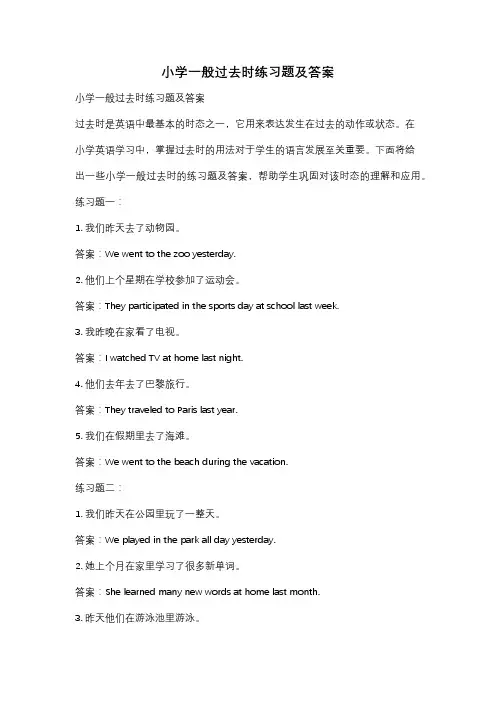
小学一般过去时练习题及答案小学一般过去时练习题及答案过去时是英语中最基本的时态之一,它用来表达发生在过去的动作或状态。
在小学英语学习中,掌握过去时的用法对于学生的语言发展至关重要。
下面将给出一些小学一般过去时的练习题及答案,帮助学生巩固对该时态的理解和应用。
练习题一:1. 我们昨天去了动物园。
答案:We went to the zoo yesterday.2. 他们上个星期在学校参加了运动会。
答案:They participated in the sports day at school last week.3. 我昨晚在家看了电视。
答案:I watched TV at home last night.4. 他们去年去了巴黎旅行。
答案:They traveled to Paris last year.5. 我们在假期里去了海滩。
答案:We went to the beach during the vacation.练习题二:1. 我们昨天在公园里玩了一整天。
答案:We played in the park all day yesterday.2. 她上个月在家里学习了很多新单词。
答案:She learned many new words at home last month.3. 昨天他们在游泳池里游泳。
答案:They swam in the swimming pool yesterday.4. 我们去年在学校举办了一次音乐会。
答案:We held a concert at school last year.5. 我们上周末去了电影院。
答案:We went to the cinema last weekend.练习题三:1. 我们昨天晚上吃了披萨。
答案:We ate pizza last night.2. 她在周末帮助了她的父母。
答案:She helped her parents on the weekend.3. 他们去年夏天去了北京旅行。
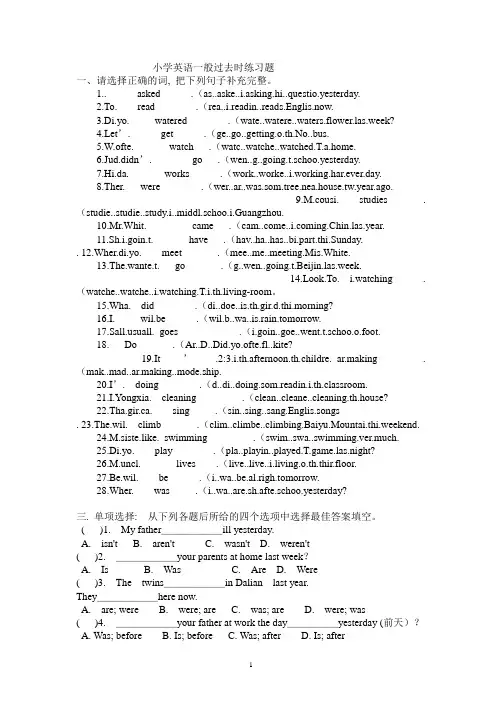
小学英语一般过去时练习题一、请选择正确的词, 把下列句子补充完整。
1..______asked______.(as..aske..i.asking.hi..questio.yesterday.2.To.____read________.(rea..i.readin..reads.Englis.now.3.Di.yo._____watered________.(s.week?4.Let’.______get______.(ge..go..getting.o.th.No..bus.5.W.ofte._______watch___.(watc..watche..watched.T.a.home.6.Jud.didn’.________go___.(wen..g..going.t.schoo.yesterday.7.Hi.da._______works______.(work..worke..i.working.har.ever.day.8.Ther.___were________.(wer..ar..was.som.tree.nea.house.tw.year.ago.9.M.cousi.____studies_______.(studie..studie..study.i..middl.schoo.i.Guangzhou.10.Mr.Whit._________came___.(s.year.11.Sh.i.goin.t._______have___.(hav..ha..has..bi.part.thi.Sunday.. 12.Wher.di.yo.____meet_______.(mee..me..meeting.Mis.White.13.The.wante.t.___go_______.(s.week.14.Look.To.__i.watching______.(watche..watche..i.watching.T.i.th.living-room。
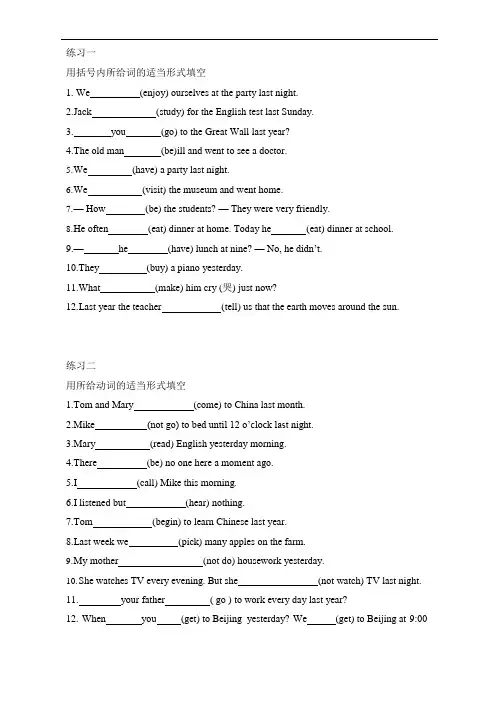
用括号内所给词的适当形式填空1. We (enjoy) ourselves at the party last night.2.Jack (study) for the English test last Sunday.3. you (go) to the Great Wall last year?4.The old man (be)ill and went to see a doctor.5.W e (have) a party last night.6.W e (visit) the museum and went home.7.— How (be) the students? — They were very friendly.8.H e often (eat) dinner at home. Today he (eat) dinner at school.9.—he (have) lunch at nine? — No, he didn’t.10.They (buy) a piano yesterday.11.What (make) him cry (哭) just now?st year the teacher (tell) us that the earth moves around the sun.练习二用所给动词的适当形式填空1.Tom and Mary (come) to China last month.2.Mike (not go) to bed until 12 o’clock last night.3.Mary (read) English yesterday morning.4.There (be) no one here a moment ago.5.I (call) Mike this morning.6.I listened but (hear) nothing.7.Tom (begin) to learn Chinese last year.st week we (pick) many apples on the farm.9.M y mother (not do) housework yesterday.10.She watches TV every evening. But she (not watch) TV last night.11. your father ( go ) to work every day last year?12. When you (get) to Beijing yesterday? We (get) to Beijing at 9:001. He came here last month. (改为否定句) He here last month.2.They played football this morning. (改为一般疑问句并作简略回答)—they football this morning? —Yes, they ./No, they .3.They went to Beijing last year. (就划线部分提问)they last year.4.Tom watched TV last night. (改为一般疑问句) Tom TV last night?5.Mary does homework every day. (用last night 改写句子)Mary .6.He’s cleaning his rooms. (划线提问)he ?7.My family went to the beach last week. (划线提问)family last week?按要求变换句型。
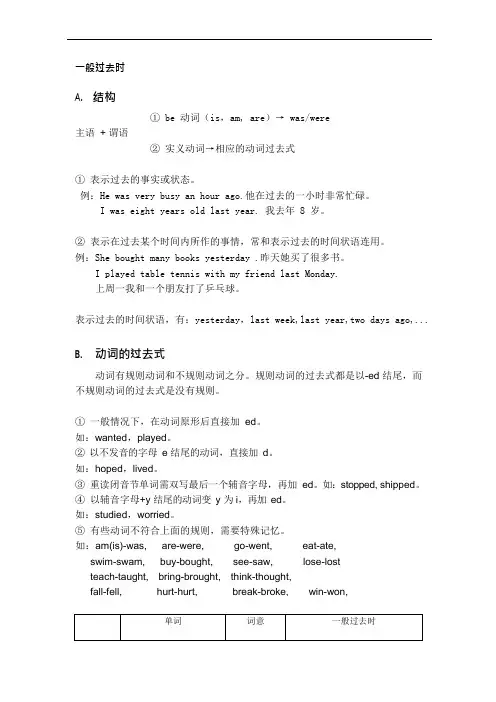
一般过去时A.结构① be 动词(is,am, are)→ was/were主语+ 谓语②实义动词→相应的动词过去式①表示过去的事实或状态。
例:He was very busy an hour ago.他在过去的一小时非常忙碌。
I was eight years old last year. 我去年 8 岁。
②表示在过去某个时间内所作的事情,常和表示过去的时间状语连用。
例:She bought many books yesterday .昨天她买了很多书。
I played table tennis with my friend last Monday.上周一我和一个朋友打了乒乓球。
表示过去的时间状语,有:yesterday,last week,last year,two days ago,...B. 动词的过去式动词有规则动词和不规则动词之分。
规则动词的过去式都是以-ed 结尾,而不规则动词的过去式是没有规则。
①一般情况下,在动词原形后直接加ed。
如:wanted,played。
②以不发音的字母e 结尾的动词,直接加d。
如:hoped,lived。
③重读闭音节单词需双写最后一个辅音字母,再加ed。
如:stopped, shipped。
④以辅音字母+y 结尾的动词变y 为i,再加ed。
如:studied,worried。
⑤有些动词不符合上面的规则,需要特殊记忆。
如:am(is)-was, are-were, go-went, eat-ate,swim-swam, buy-bought, see-saw, lose-lostteach-taught, bring-brought, think-thought,fall-fell, hurt-hurt, break-broke, win-won,直接加edwalk 走climb 爬turn 转弯learn 学习cook dinner 做饭play the piano 弹钢琴visit grandparents 看望(外)祖父母clean the bedroom 打扫卧室wash the clothes 洗衣服answer the phone 接电话listen to music 听音乐clean the room 打扫房间collect insects 收集昆虫jump 跳row 划work 工作show 展示look 看help 帮助relax 放松return 归还pass 传递watch insects 观察昆虫pick up leaves 采摘树叶paint 绘画kick 踢ski 滑雪直接加dlike 像,喜欢live 居住dance 跳舞use a computer 使用计算机love 爱taste 尝close 关上prepare 准备不规则变化eat 吃have 有;吃buy 买take 买;带go 去sing 唱歌teach(taught)教run(ran)跑fight(fought)打架get up 起床swim 游泳fly 飞swing(swung)荡sleep(slept)睡觉sweep(swept) the floor 扫地do 做make the bed 铺床draw(drew) pictures 画画write(wrote) a letter 写信catch(caught)butterflies 捉蝴蝶meet(met) 见面drink(drank)喝tell(told)告诉ride(rode)骑find(found)寻找到drive(drove)驾驶come(came)来become(became)变成feel(felt)感觉到think(thought)思考meet(met)遇见fall(fell)落下leave 离开wake(woke) up 醒来bring 带来is am are see 看到grow 种植grew stand(stood)站立词形不变read books 读书put 放set the table 摆饭桌hit (hit)撞击、打cut 切、割最后一个字母双写再加edstop(stopped)停shop 购物把y 变成i 再加edempty the trash 倒垃圾study 学习C. 过去式的肯定、否定、疑问及简短回答①过去式的肯定、否定、疑问及简短回答的形式可表示如下:肯定句I (He, She, We, You, They) went there by bus.否定句I (He, She, We, You, They) didn't go there by bus.疑问句Did I (he, she, we, you ,they) go the by bus?简短回答Yes, I (He, She, We, You, They) did.No, I (He, She, We, You, They) didn't.动词be 的肯定、否定、疑问及简短回答形式如下:肯定句I (He, She) was there.We (You, They) were there.否定句I (He, She) wasn't there.We (You, They) weren't there疑问句Was I (he, she) there?Were we (you, they) there?简短回答No, I (he, she) wasn't.we (you, they) weren't.一、将下列动词变成过去式。
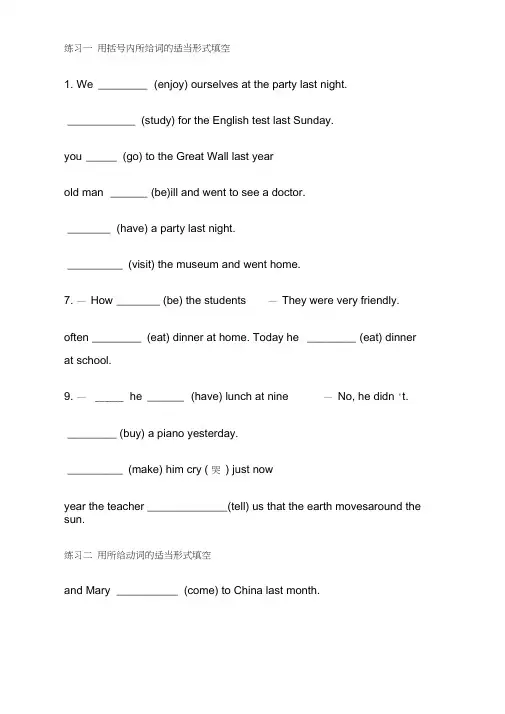
练习一用括号内所给词的适当形式填空1. We ________ (enjoy) ourselves at the party last night.___________ (study) for the English test last Sunday.you _____ (go) to the Great Wall last yearold man ______ (be)ill and went to see a doctor._______ (have) a party last night._________ (visit) the museum and went home.7. —How _______ (be) the students —They were very friendly.often ________ (eat) dinner at home. Today he ________ (eat) dinner at school.9. — ______ he ______ (have) lunch at nine —No, he didn 't. ________ (buy) a piano yesterday._________ (make) him cry ( 哭) just nowyear the teacher _____________ (tell) us that the earth movesaround the sun.练习二用所给动词的适当形式填空and Mary __________ (come) to China last month.(not go) to bed until 1 2 o ' clock last night. (read) English yesterday morning.________ (be) no one here a moment ago.__________ (call) Mike this morning. listened but (hear) nothing.__________ (begin) to learn Chinese last year.week we _________ (pick) many apples on the farm.mother _______________ (not do) housework yesterday.watches TV every evening. But she _________________ (not watch) TV last night.your father _______ ( go ) to work every day last year12. When _____ you ___ (get) to Beijing yesterday We ____ (get)1. Hecamehere last mon th.(改为否定句)He __________________ here last mon th.played football this morning.(改为一般疑问句并作简略回答)— _____ they ______ f ootball this morni ng —Y es, they _____ . / No, they ______ .to Beijing at 9:00 句型转换went to Beijing last year.(就划线部分提问)__________________ t hey ________ last year.watched TV last night.(改为一般疑问句) __________ Tom ________ TV last ni ghtdoes homework every day.(用last night 改写句子)Mary _______________________________________ .6. He s cleaning his rooms. (戈U 线提问)_____ ______ h e _______7. My family went to the beach last week. (戈U 线提问)_______ ________ ________ family __________ last week按要求变换句型1. Father bought me a new bike. (同义句)Father bought 2. Frank read an in teresti ng book about history. (一般疑问句)an in terest ing book about history7. They read En glish last ni ght.否定句: ____________________________________ 般疑问句Thomas RMB 10 on this book.4. I had some friends. ( ——一 般 疑问句) friends5. Sally did some dish in the morning. (否定句)Sally dish in the morni ng.6. He is a tall and thin boy.(戈U 线提 问) he(否定句)me.______ Frank 3. Thomas spent RMB 10 on this book.对划线部分提问: ___________________________________________________________ a telephone call for you just now. (be)_________ not enough people to pick apples that day. ( be)____________ any hospitals ( 医院) in myhometown( 家乡) in 1940. ( be not)___________ enough milk at home last week, wasn 't there___________ to Japan last week. ( move)20. - When _______ you _________ (come) to China - Last year.she ________ (have) supper at home___________ (not clean) the room just now.(be) it cold in your city yesterdaymany people _______ (be) there in your class last term_______ (be) hot yesterday and most children ________________ (be) outside.26. There _______ (be) a football match on TV yesterday evening,but I ________ (have) no time to watch it.27. He ate some bread and ________ (drink) some milk.28. ______ he _________ (finish) his homework last night29. I _________(be) tired yesterday.30. I _________(gain ) Arts degree last year.31. What _______ you __________ (do) last night32. My grandfather _______ (leave) Hong Kong for New York in 1998.33. What ______ he ______ (do) yesterday34. Last week I _____ (buy) a new bike.35. He _______ (be) here just now.36. He ________ (not find ) his key last night.37. My father _________ (drink) a lot of wine yesterday.38. ______ you ______ (finish) your homework yesterday39. I _______ (eat) some eggs and bread this morning.40. Her mother ________ (not give) the girl any present.41. Last year Mr. Smith ____ (go ) to China and Japan.42. He ____ (have) a wonderful time.43. He ____ (do) a lot of different things and ___ (talk) toa great number of different people.44. He ___ (eat) Chinese and Japanese food and ____ (visit) alot of interesting places.45. When he ___ (go) back to England, he ____ (be) very tired.46. A week ago, Kitty and Ben _______ (be) in the countryside.47. At first, the wind ________ (blow) lightly.48. The leaves __________ (blow) slightly in the wind.49. They ______ (fly) their kite happily in the gentle breeze.50. Suddenly, the wind _______ (become) stronger.51. The clouds in the sky ______ (move) quickly.52. Leaves _______ (fall) from trees.53. The sky became dark. Kitty and Ben ______________ (go ) home immediately.54. Kitty and Ben ________ (stay) at home. They ___________ (watch) TV.65. The big clean-up _______ (begin) immediately. Kitty and Benwent outside again.、用所给动词的正确时态填空1. He___ ____ TV every evening. (watch)2. We always_______________ to school on foot. (go)3. Tom, with his classmates, often __ football aft er school(play)4. Their classroom _____ four big windows. (have)5. Your shoes ___ under the bed. (be)6. She _ ____ for her friends at the bus stop now. (wait)7. Sorry, I ___________ no enough money with me now. (have)8. The days _________ longer and longer now. (get)9. _____ here and _________ by me. (come, stand)10. Look, the bus ___________ . (come)11. His uncle usually ______________ to work by bus. (go)12. Sorry, I 'm busy. I ______________ to a friend of mine inHangzhou. (write)13. Lin Tao and his classmates _____________ on a farm nextweek. (work)14. We __ to the Great Wall if it __ finetomorrow. (go, be)15. Look at the cloud I think it (rain)16. Mary ___thirteen next year. (be)17. Today is Monday. Tomorrow ______ Tuesday. (be)18. There ___ no hospitals here ten years ago. (be)19. He _______ you to the station tomorrow morning. (see)20. It ________ very hard. We'd better stay at home. (rain)21. I always ________ up at six in the morning, but I____ up a little later yesterday. (get )22. She _______ swim very well when she was five years old. (can)23. They ________ in Beijing in 1960. (be)24. He always _________ to work by bike when he was in Shanghai. (go)25. I ______ you up as soon as I _______________ to Nanjing. ( ring, get)26. They never ___________ in the room. (smoke)27. I _____ to school yesterday because I _______________ ill. (n ot go, be)28. John ________ like his father. (look)29. Be quiet. The baby ____________ .(sleep)30. Some young people __________ in the lake. (swim)五、选择填空( ) 1. Lee _________ his mobile phone at home.A. leaveB. leavesC. leavedD. left( ) 2. ______ he ______ a good rest No, he didn ' t.A. Do, hadB. Did, haveC. Did, hadD. Was, had( ) 3. As soon as he _________ , he _____ to his family.A. arrived, writesB. arrived, writtenC. arrived, wroteD. arriveds, write ( ) 4. Mr. Black was late because he _______ his way.A. lostedB. loseC. losesD. lost( ) 5. When __________ Lee _______ school this morningA. did, got toB. did, get toC. did, getD. did, got( ) 6. Will you please say it again I _________ quite ______you.A. didn 't, hearB. don 't, heardC. didn 't, heardD. don 't, hear( ) 7. ______ you _______ at six o ' clock yesterdayA. Do ,get upB. Did, get upC. Do, got upD. Did, gotup( ) did you see __________A. nowB. every dayC. these daysD. just now( ) went into the room and ________ the door.A. lockB. lockingC. locksD. locked( ) 10. —What __________ you ______ last week —I bought a bag.A. did ,buyB. did , boughtC. do, buyD. do, bought( ) 11. —____________ he ___ his lunch —Yes, he did.A. Does ,hasB. Does, haveC. Did, haveD. Did, had( )12. —Did the thieves _____ into the car —No, they ______ .A. fell, didn ' tB. fall(落下),didC. jump (跳),didn ' tD.jump, did( ) 13. -When did May come back from Hong Kong -She __ fromHong Kong last Friday.A. comebackB. comesbackC. returned backD. cameback( ) 14. ___ she ____ this dictionary in the bookshop nearbylast weekA. Did, buyB. Does, buyC. Did, boughtD. Does, buys( ) 15. He ___ to the station this morning and was ______ forthe train.A. hurry, in timeB. hurries, on timeC. hurried, in timeD. hurried, at time ( ) 16. Where _____ Uncle Sun yesterday A. was B. were C.did D. does( ) 17. —Have you seen him today —Yes, I __________ him this morning.A. seeingB. seeC. seesD. saw( ) 18. He _________ worried when he heard the news. A. is B.was C. does D. did( ) 19. There ______ a telephone call for my brother StevenyesterdayA. isB. areC. wasD. were( ) 20. Liu Fengwei __________ three yuan for the lost library book.A. paidB. payC. spentD. lost( ) 21. He ____ in this school in 1958.A. taughtB. teachC. teachesD. teaching( ) 22. They ______ tired so they stopped ____ a rest.A. are, haveB. were, haveC. were, to haveD. are, having( ) 23. Yesterday I __________ in bed all day because I had a fever.A. layB. lieC. laidD. lied( ) 24. It was raining hard when he _____ home.A. gotB. getC. getsD. was getting( ) 25. She said her brother __________ in Beijing. He _______ to Japan on business last week.A. wasn ' t, wentB. hasn ' t, wentC. wasn ' t, goD.isn ' t, went答案、was did went had wasn' t weren' t spent cooked read clea ned lived studied二、did do did do went went三、 2. studied go 5. was had have四、't come play did didn ' t did go 4. Did watch homeworklast ni ght五、六、1. is-was 2. go-we nt 3. goes-we nt 4. can-could 5.saw-see 6. wasn't-didn ' t 7. didn 't-didn ' t do 8.wait-waited 9. fin d-fo und 10. did he-did he do七、 2. didn 't go , got 3. read 4. was 5. called 't do 't watch 11. Did go get got 13. made 14. told 16. were 't 't clean were had finish do do t find fin ish 't give 42. had talked visitedwas 46. were 47. blew watched、按要求变换句型read 's doing don't you 't spend were my going I any don't think she is Lily 's sister. 't dodoes look likedidn't read English last night. Did they read Englis h last night Yes,they did./No,they didn't. What did th ey do last night、用所给动词的正确时态填空:1. watches2. go3. plays4. has5. are6. is wait ing7. have8. are getting9. come, stand 10. is coming 11. goes12.am writing13. are going to work/will work 14. are going to / will go, is 15. is going to rain16. will be 17. will be 18. were 19 . will see 20. is raining 21. get, got 22. Could 23. were 24. w ent 25. will/shall ring, get 26. smoke 27. didn't go, was 28. looks 29. is sleeping 30. are swimmingnew bike for。
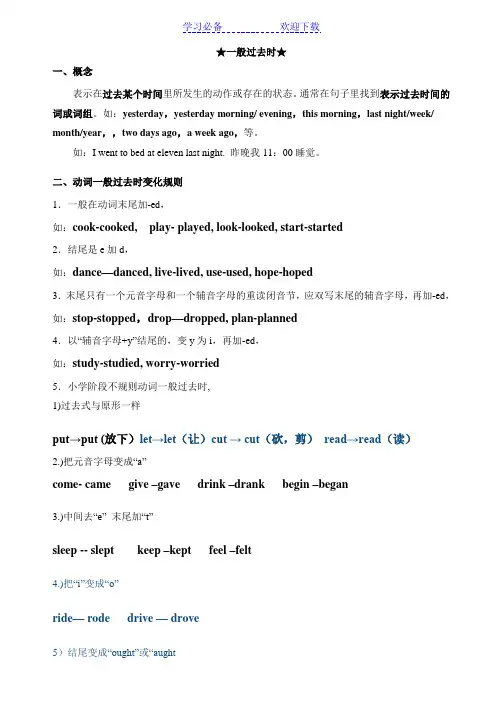
★一般过去时★一、概念表示在过去某个时间里所发生的动作或存在的状态。
通常在句子里找到表示过去时间的词或词组。
如:yesterday,yesterday morning/ evening,this morning,last night/week/ month/year,,two days ago,a week ago,等。
如:I went to bed at eleven last night. 昨晚我11:00睡觉。
二、动词一般过去时变化规则1.一般在动词末尾加-ed,如:cook-cooked, play- played, look-looked, start-started2.结尾是e加d,如:dance—danced, live-lived, use-used, hope-hoped3.末尾只有一个元音字母和一个辅音字母的重读闭音节,应双写末尾的辅音字母,再加-ed,如:stop-stopped,drop—dropped, plan-planned4.以“辅音字母+y”结尾的,变y为i,再加-ed,如:study-studied, worry-worried5.小学阶段不规则动词一般过去时,1)过去式与原形一样put→put (放下)let→let(让)cut → cut(砍,剪)read→read(读)2.)把元音字母变成“a”come- came give –gave drink –drank begin –began3.)中间去“e” 末尾加“t”sleep -- slept keep –kept feel –felt4.)把“i”变成“o”ride— rode drive — drove5)结尾变成“ought”或“au ghtthink -thought buy- bought bring- brought catch –caught buy—bought6)“ow”或“aw”变成“”ewknow- knew throw –threw draw –drew7)结尾”d”变“t”build- built spend-spent8)剩余不规则动词表am, is-was are –were do,does-did go-wentmake-made write-wrote take—took run—ran see—saw learn—learnt speak—spoke meet—met wear—wore get –got ring—rang tell—told lose—lost smell—smelt say—said sing—sang send—sent forget—forgot can—could hear—heard sit—sat eat-ate fall off—fell off have、has—had三、句式变化1.(be动词类)在表示过去存在的状态的句子中在was, were的后面加上not。
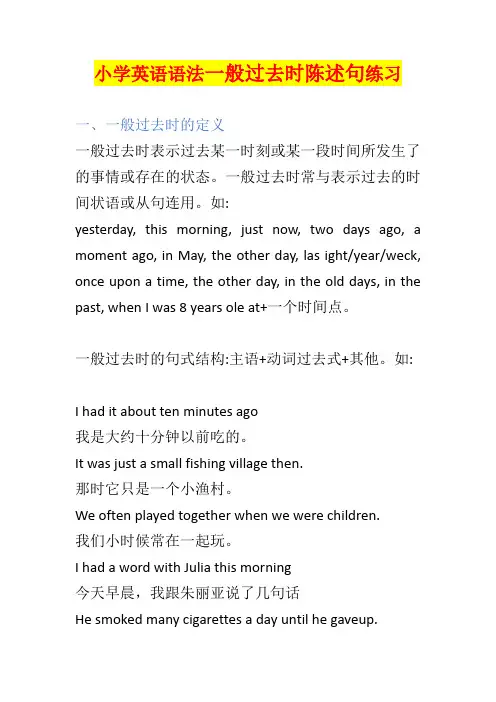
小学英语语法一般过去时陈述句练习一、一般过去时的定义一般过去时表示过去某一时刻或某一段时间所发生了的事情或存在的状态。
一般过去时常与表示过去的时间状语或从句连用。
如:yesterday, this morning, just now, two days ago, a moment ago, in May, the other day, las ight/year/weck, once upon a time, the other day, in the old days, in the past, when I was 8 years ole at+一个时间点。
一般过去时的句式结构:主语+动词过去式+其他。
如:I had it about ten minutes ago我是大约十分钟以前吃的。
It was just a small fishing village then.那时它只是一个小渔村。
We often played together when we were children.我们小时候常在一起玩。
I had a word with Julia this morning今天早晨,我跟朱丽亚说了几句话He smoked many cigarettes a day until he gaveup.他没戒烟那阵子,一天抽很多烟。
二、一般过去时的基本用法1.带有确定的过去时间状语时,要用过去时。
如: I had a party the other day.前几天我举行了一个聚会I met Lin Tao this morning.今天上午我遇见了林涛。
I was therea momentago.刚才我在那儿。
He bought the computer five years ago.他五年前买了这台电脑。
2.表示过去连续发生的动作时,要用过去时。
如:The boy opened his eyes for a moment, looked at the captain, and then died那男孩把眼睛张开了一会儿,看看船长,然后就去世了。
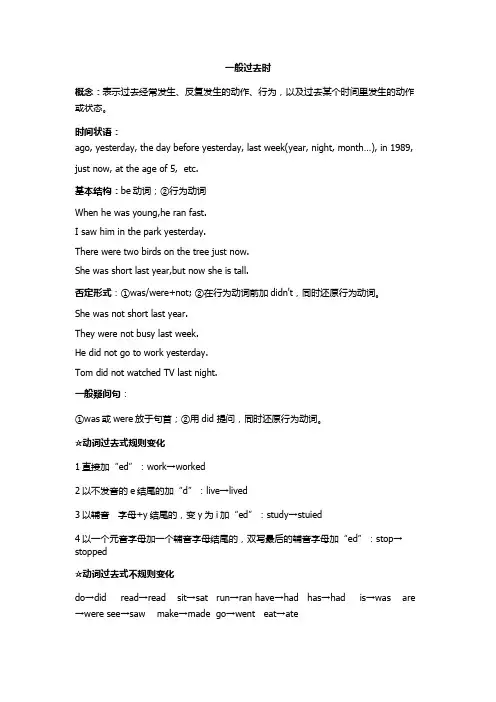
一般过去时概念:表示过去经常发生、反复发生的动作、行为,以及过去某个时间里发生的动作或状态。
时间状语:ago, yesterday, the day before yesterday, last week(year, night, month…), in 1989, just now, at the age of 5, etc.基本结构:be动词;②行为动词When he was young,he ran fast.I saw him in the park yesterday.There were two birds on the tree just now.She was short last year,but now she is tall.否定形式:①was/were+not; ②在行为动词前加didn't,同时还原行为动词。
She was not short last year.They were not busy last week.He did not go to work yesterday.Tom did not watched TV last night.一般疑问句:①was或were放于句首;②用did 提问,同时还原行为动词。
☆动词过去式规则变化1直接加“ed”:work→worked2以不发音的e结尾的加“d”:live→lived3以辅音字母+y结尾的,变y为i加“ed”:study→stuied4以一个元音字母加一个辅音字母结尾的,双写最后的辅音字母加“ed”:stop→stopped☆动词过去式不规则变化do→did read→read sit→sat run→ran have→had has→had is→was are →were see→saw make→made go→went eat→ate一般过去时的练习一、用所给的动词的适当形式填空。
⒈He ___________(visit) the Great Wall last year.2.We____________(have) a good time yesterday.3.We often __________(go) to school by bus last year.4.I __________(live)in the village when I was a child.5.Mike__________(see) a big tiger in the nature park last year.6.Sam___________ (do) the housework yesterday.7.________(do) you _________(enjoy) yourself yesterday?8.________(do)you __________(play) the violin in the artroom yesterday?9.I __________ (eat) a big pizza yesterday.10.There_________ (be) many sheep on the farm last year.11. I _________ (watch) a cartoon on Saturday.12. Her father __________ (read) a newspaper last night.13. We _________ to zoo yesterday, we ___________ to the park. (go)14. _________ you __________ (visit) your relatives last Spring Festival?15. _________ he __________ (fly) a kite on Sunday? Yes, he __________.二、单项选择( ) 1. She watered the flowers ________.A tomorrowB sometimesC yesterday morning( ) 2.What ____ Mike do last weekend ?A doB doesC did( ) 3. I ___ my room last Sunday.A cleanedB cleanC am cleaning( ) 4. _____ you _____ TV last night .A Do, watchB Did, watchC Did, watched( ) 5.---Did your father write an e-mail yesterday ?A Yes, he did.B Yes, he doesC No, he don’t( ) 6.They _____ on a trip in February ,2007.A are goingB goingC went( ) 7. ____ he ____ football two days ago?A Does , playB Did , playedC Did , play三、Be动词的过去时练习(一)用be动词的适当形式填空。
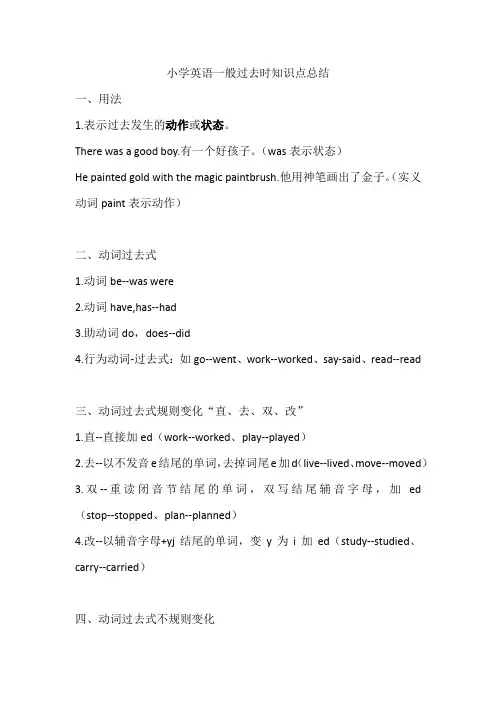
小学英语一般过去时知识点总结一、用法1.表示过去发生的动作或状态。
There was a good boy.有一个好孩子。
(was表示状态)He painted gold with the magic paintbrush.他用神笔画出了金子。
(实义动词paint表示动作)二、动词过去式1.动词be--was were2.动词have,has--had3.助动词do,does--did4.行为动词-过去式:如go--went、work--worked、say-said、read--read三、动词过去式规则变化“直、去、双、改”1.直--直接加ed(work--worked、play--played)2.去--以不发音e结尾的单词,去掉词尾e加d(live--lived、move--moved)3.双--重读闭音节结尾的单词,双写结尾辅音字母,加ed (stop--stopped、plan--planned)4.改--以辅音字母+yj结尾的单词,变y为i加ed(study--studied、carry--carried)四、动词过去式不规则变化1.中间有双e,去e尾加t(保持keep--kept)2.结尾d要变成t(建筑build--built)3.遇见i来,a来替(坐sit--sat)4.若是买来想打仗,战甲ought要换上(买buy--bought、带来bring--brought)5.教书抓住刷流氓,制服aught来帮忙(教teach--taught、catch--taught)6.ow/aw凑热闹,变成ew最时尚(知道know--knew、生长grow--grew)7.“放、读、切、让”过去原形都一样(放put--put、切cut--cut、让let--let、读read/ri:d/--read/red/)五、过去式+ed的发音“清清浊浊,元后浊,td后面读id”1.在以清辅音结尾的规则动词后,ed读作/t/(worked//)2.在以浊辅音或元音结尾的规则动词后,ed读作/d/3.在以/t/或/d/结尾的规则动词后,ed读作//六、与过去时连用的时间词1.ago家族(两分钟之前two minutes ago、五年之前five years ago、很久很久之前long long ago)st家族(上周last week、上个月last month、去年冬天last winter)3.yesterday家族(昨天早晨yesterday morning、前天the day before yesterday)4.that家族(那天早上that morning、那天that day、那年that year)5.其他(刚才just now、那些天in those days、在1980年in 1980、那是at that time、以前once upon a time)七、句式变化1、肯定句变否定句:+not表动作(无be,借助did,did+ not)表状态(be+not)2、肯定句变一般疑问句:一挪二改表动作(一挪:有be挪be,没be借did,先借再挪;二改:人称一变二,句号变问号)表状态(一挪:be挪到句首;二改:人称一变二,句号变问号)3、对划线部分提问:一找二挪三改表动作(一找:找到划线部分对应的疑问词,将疑问词放到句首;二挪:有be动词的挪be,没有be动词的借助did,先挪再借,挪到疑问词后,其他照抄;三改:人称一变二,句号变问号)表状态(一找:找到划线部分对应的疑问词,将疑问词放到句首;二挪:be挪到疑问词后,其他部分照抄;三改:人称一变二,句号变问号。
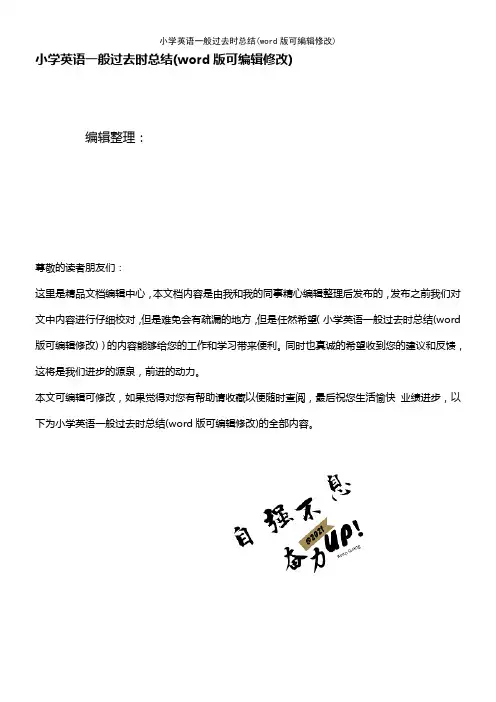
小学英语一般过去时总结(word版可编辑修改)编辑整理:尊敬的读者朋友们:这里是精品文档编辑中心,本文档内容是由我和我的同事精心编辑整理后发布的,发布之前我们对文中内容进行仔细校对,但是难免会有疏漏的地方,但是任然希望(小学英语一般过去时总结(word 版可编辑修改))的内容能够给您的工作和学习带来便利。
同时也真诚的希望收到您的建议和反馈,这将是我们进步的源泉,前进的动力。
本文可编辑可修改,如果觉得对您有帮助请收藏以便随时查阅,最后祝您生活愉快业绩进步,以下为小学英语一般过去时总结(word版可编辑修改)的全部内容。
一般过去时A.结构① be动词(is,am, are)→ was/were主语 + 谓语②实义动词→相应的动词过去式①表示过去的事实或状态。
例:He was very busy an hour ago.他在过去的一小时非常忙碌。
I was eight years old last year. 我去年8岁。
②表示在过去某个时间内所作的事情,常和表示过去的时间状语连用。
例:She bought many books yesterday 。
昨天她买了很多书。
I played table tennis with my friend last Monday。
上周一我和一个朋友打了乒乓球。
表示过去的时间状语,有:yesterday,last week,last year,two days ago,..。
B.动词的过去式动词有规则动词和不规则动词之分。
规则动词的过去式都是以-ed结尾,而不规则动词的过去式是没有规则。
①一般情况下,在动词原形后直接加ed。
如:wanted,played。
②以不发音的字母e结尾的动词,直接加d。
如:hoped,lived。
③重读闭音节单词需双写最后一个辅音字母,再加ed。
如:stopped, shipped。
④以辅音字母+y结尾的动词变y为i,再加ed。
如:studied,worried.⑤有些动词不符合上面的规则,需要特殊记忆。
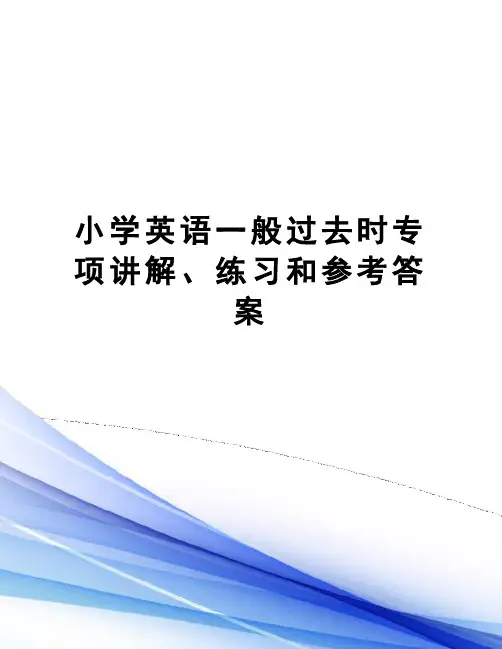
小学英语一般过去时专项讲解、练习和参考答案一般过去时专项讲解与练习一、概念:一般过去时表示过去某一时候发生的动作或存在的状态。
常与一般过去时连用的时间状语有:yesterday; 昨天just now刚才the day before yesterday;前天⋯⋯ago ⋯⋯之前(例如:三天前 three days ago )Last ⋯⋯上一个⋯(例如:上周星期天last Sunday )in 1990在1990年(in+过去时间)二、分类(一) be 动词的一般过去时:肯定句:主语 +be 动词的一般过去时( was/were)否定句:主语+be动词的一般过去时(was/were)+not一般疑问句: be 动词的一般过去时( was/were )+主语(二) there be结构的一般过去时与be 动词的一般过去时的变化基本一致。
(三)一般动词的过去时:肯定句:主语 +动词的过去时( I laughed.)否定句:主语 +did not+ 动词原形( I didn’t laugh.)一般疑问句: Did+主语 +动词原形( Did you laugh?)三.巧记 chant动词一般过去时,表示过去发生事;be 用 was 或用 were, have,has变had;谓语动词过去式,过去时间坐标志;一般动词加 -ed ,若是特殊得硬记。
否定句很简单,主语之后didn ’ t 添;疑问句也不难, did 放在主语前;如果谓语之前有 did ,谓语动词需还原;动词若是 was,were, 否定就把 not 添。
四、习题练习(一)用动词的适当形式填空:1.He ______ (work) in that bank four years ago.2.She ______ (live) in the US last Monday.3.I ______ (see) him yesterday.4.He _______(come) to school at 6 o’clock this morning.5.The boy _______ (have) a bad cold yesterday.6.When _______ you _______ (buy) that house?7.He _______(tell) a story to his daughter yesterday.8._____ you ____ (try) to call me last night?9.What _______you _______ (buy) in the shop?I ______ (buy) a coat just now.10. The doctor ______ (get) up late this morning.11.She ________ (paint) the wall last month.12.My mother _______ (be) a worker 20 years ago.13.________ (be) you here just now?No, I ________ (be not) here.14.Why _______ your brother _______ (cry) last night?15.It ______(be) my mother’s birthday yesterday.(二)翻译下列句子:1.我上周去看爷爷和奶奶了。
一般过去时的概念:一般过去时表示过去某个时间发生的动作或存在的状态。
常和表示过去的时间状语连用,如:last year, yesterday等。
例如:I saw him in the street yesterday. 昨天我在街上看见他了。
一般过去时的结构1、肯定形式:主语+动词过去式+其他例句:She often came to help us in those days.2、否定形式:①was/were+not;②在行为动词前加didn't,同时还原行为动词例句:I didn't know you like coffee.3、一般疑问句:①Did+主语+谓语动词原型+其他?②WasWere+主语+表语?例如:-Did you go to Beijing last week?-Yes, we did. (No, we didn't.)4、一般过去时的特殊疑问句的构成:疑问词+did+主语+动词原形+其它?例如:-What did you do last night?-I did my homework.动词过去式的构成:(1)规则动词过去式的构成有四条规则:①一般在动词原形末尾直接加上-ed。
如:look-looked。
②以不发音的字母e结尾的动词,去e再加-ed。
如:live-lived。
③末尾只有一个辅音字母的重读闭音节(辅元辅结构),先双写这个辅音字母,再加-ed。
如:stop-stopped。
④末尾是辅音字母+y结尾的动词,先变y为i,然后再加-ed。
如:study-studied。
(2)不规则动词的过去式需特殊记忆。
如:am(is)-was, are-were, go-went, come-came, take-took, have (has)-had等。
一般过去时口诀一般过去时并不难,表示过去动作、状态记心间。
动词要用过去式,时间状语句末站。
否定句很简单,didn't 站在动词原形前,其它部分不要变。
一般过去时语法总结及习题1.一般过去时表示过去某个时间发生的动作或存在的状态,常和表示过去的时间状语连用。
一般过去时也表示过去经常或反复发生的动作感谢。
2.Be动词在一般过去时中的变化:⑴am 和is在一般过去时中变为_______。
(was not=_________)⑵are在一般过去时中变为________。
(were not=__________)⑶带有was或were的句子,其否定、疑问的变化和is, am, are一样,即否定句在was或were后加not,一般疑问句把was或were调到句首。
3.句中没有be动词的一般过去时的句子否定句:didn’t +动词原形,如:Jim ______ go home yesterday.一般疑问句:在句首加did,句子中的动词过去式变回原形。
如:____ Jim go home yesterday?特殊疑问句:⑴疑问词+did+主语+动词原形?如:What ______ Jim ______yesterday?⑵疑问词当主语时:疑问词+动词过去式?如:Who ______ to home yesterday?一般过去时练习写出下列动词的过去式is\am_________ fly_______ plant________ are ________ drink_________play_______ go________ make ________ does_________ dance________worry________ ask _____ taste_________ eat__________ draw________put ______ throw________ kick_________ pass_______ do ________一、用行为动词的适当形式填空1. He _________ (live) in Wuxi two years ago.2. The cat ________ (eat) a bird last night.3. We _______ (have) a party last Halloween.4. Nancy ________ (pick) up oranges on the farm last week.5. I ________ (make) a model ship with Mike yesterday.6. They ________ (play) chess in the classroom last PE lesson.7. My mother _______ (cook) a nice food last Spring Festival.8. The girls ________ (sing) and _______ (dance) at the party.9. I ______ (watch) a cartoon on Saturday.10. Her father _______ (read) a newspaper last night.11. I ______ an English teacher now.12. She _______ happy yesterday.13. We _________ to zoo yesterday, we _____ to the park. (go)14. ______ you _______ (visit) your relatives last Spring Festival?15. ______ he _______ (fly) a kite on Sunday? Yes, he ______.16. Gao Shan _______ (pull) up carrots last National Day holiday.17. I ____________ (sweep) the floor yesterday, but my mother ______.18. What ______ she ____ (find) in the garden last morning? She _____ (find) a beautiful butterfly.19. They _______ glad to see each other last month.20. Helen and Nancy ________ good friends.21. The little dog _____ two years old this year.22. Look, there ________ lots of grapes here.23. There ________ a sign on the chair on Monday..24. Today _____ the second of June. Yesterday ______ the first of June. It _____ Children’s Day. All the studen ts ______ very excited.二、句型转换1. There was a car in front of the house just now.否定句:________________________________________________一般疑问句:____________________________________________肯、否定回答:__________________________________________2. All the students were very excited.否定句:________________________________________________一般疑问句:____________________________________________肯、否定回答:__________________________________________3. They were in his pocket.否定句:________________________________________________一般疑问句:____________________________________________4. Nancy went to school early.否定句:________________________________________________一般疑问句:____________________________________________5. We sang some English songs.否定句:________________________________________________一般疑问句:____________________________________________。
小学英语语法一般过去时(包括练习)一般情况下,动词过去式的变化规则为在词尾加-ed,如:walk-walked、play-played等。
但是也有一些不规则动词需要特别注意,如:go-went、eat-ate等。
在过去时中,我们要注意使用适当的时间状语来指明动作发生的时间。
常用的时间状语包括yesterday、the day before yesterday、just now等。
同时,我们还要注意be动词在过去时中的变化,am和is变为was,are变为were。
另外,没有be动词的一般过去时句子中,否定句要使用didn’t +动词原形,疑问句要在句首加did,动词过去式变回原形。
动词过去式的变化规则一般为在词尾加-ed,但也有一些不规则动词需要特别注意。
1.一般在动词末尾加-ed,例如:pull变成pulled,cook变成cooked。
2.如果结尾是e,则加d,例如:XXX变成tasted。
3.对于末尾只有一个元音字母和一个辅音字母的重读闭音节,应该双写末尾的辅音字母,再加-ed,例如:ped。
4.对于以“辅音字母+y”结尾的动词,需要变y为i,再加-ed,例如:study变成studied。
5.不规则动词过去式包括:am/is变成was,are变成were,begin变成began,speak变成spoke,swim变成swam,build变成built,spend变成spent,XXX变成took,buy变成bought,see变成saw,teach变成taught,run变成ran,stand变成stood,tell变成told,say变成said,sweep变成swept,think变成thought,will变成would,drive变成drove,know变成knew,write变成wrote,eat变成ate,learn变成learnt或learned,sing变成sang,feel变成felt,let变成let,sit变成sat,find变成found,make变成made,sleep变成slept,fly变成flew,mean变成meant,come变成came,ot,meet变成met,copy变成copied,get变成got,put变成put,do变成did,give变成gave,read变成read,draw变成drew,hear变成heard,ride变成rode,XXX变成drank,keep变成kept,ring变成rang。
PEP人教版五年级上册语法总结及练习这份文档旨在总结和练人教版五年级上册的语法知识。
以下是对各个语法点的总结和相关练。
1. 时态- 一般现在时:描述经常性或普遍性的动作或状态。
- 现在进行时:描述正在进行的动作。
- 一般过去时:描述过去发生的动作或状态。
- 将来时:描述将要发生的动作或状态。
练:1. 用所给动词的适当形式填空:- They ____(play) basketball every Sunday.- Look! Jane ______(swim) in the pool.- Last night, we ______(watch) a movie together.- I ______(visit) Beijing next week.2. 代词- 主格代词:用作主语。
- 宾格代词:用作宾语。
- 物主代词:表示所有关系。
- 反身代词:用于强调动作的执行者为动作的承受者。
练:1. 选择正确的代词填空:- ___ is a good student. (He/She)- Please give ___ the book. (me/you)- This is ___ pencil. (his/him)- They can do it ___ . (themselves/them)3. 介词- 表示地点、时间、原因、目的等关系。
- 常见的介词有:in, on, at, of, for, with等。
练:1. 选择正确的介词填空:- I will see you ___ the park. (in/on)- We have English class ___ Monday morning. (on/at)- She bought a present ___ her mother's birthday. (for/of)- He went to school ___ his friend. (with/for)4. 数词- 基数词:表示数量。
外研社小学英语一起小学五年级上语法总结及练习题I。
There be句型的一般现在时与一般过去时1.There be一般现在时:There be句型用来表示某地是否有某物或某人,构成方式为:be动词后紧跟着名词。
肯定句的形式为:There is + 可数名词单数/不可数名词 + 地点,There are + 可数名词复数 + 地点。
否定句则在is/are后面加上not,即There XXX’t + 可数名词单数/不可数名词 + 地点,There aren’t + 可数名词复数 + 地点。
一般疑问句的形式为:Is/Are there + 名词 + 地点 + 地点?回答肯定为Yes。
there is/are。
否定为No。
there isn’t/aren’t。
针对数量提问的特殊疑问句的形式为:How many + 名词复数+ are there + 地点?How much + 不可数名词 + is there + 地点?2.There be一般过去时:There be句型用来表示过去某地是否有某物或某人,时间状语可以是昨天、早上、晚上等,也可以是由“last+一时间名词”构成的短语,如last night。
last year等,还可以是由“时间段+ago”构成的短语,如a moment ago。
a short time ago。
an hour ago等。
肯定句的形式为:There was + 可数名词单数/不可数名词 + 地点,There were + 可数名词复数 + 地点。
否定句则在was/were后面加上not,即XXX 可数名词单数/不可数名词 + 地点,There weren’t + 可数名词复数 + 地点。
一般疑问句的形式为:Was/Were there + 名词 + 地点 + 地点?回答肯定为Yes。
there was/were。
否定为No。
XXX’t。
针对数量提问的特殊疑问句的形式为:How many + 名词复数 + were there + 地点?How much + 不可数名词 + was there + 地点?就近原则:在there be句型中,be动词用单数还是复数取决于离它最近的那个名词的数量。
小学英语一般过去时练习题及答案编辑整理:尊敬的读者朋友们:这里是精品文档编辑中心,本文档内容是由我和我的同事精心编辑整理后发布的,发布之前我们对文中内容进行仔细校对,但是难免会有疏漏的地方,但是任然希望(小学英语一般过去时练习题及答案)的内容能够给您的工作和学习带来便利。
同时也真诚的希望收到您的建议和反馈,这将是我们进步的源泉,前进的动力。
本文可编辑可修改,如果觉得对您有帮助请收藏以便随时查阅,最后祝您生活愉快业绩进步,以下为小学英语一般过去时练习题及答案的全部内容。
小学英语一般过去时练习题一、请选择正确的词,把下列句子补充完整。
1。
I ______asked_______ (ask / asked / is asking) him a question yesterday.2. Tom ____read_________ (read / is reading / reads) English now.3. Did you _____watered_________ (water / watered / waters)flowers last week?4。
Let's ______get_______ (get / got / getting) on the No. 1 bus.5. We often _______watch____ (watch / watches / watched)TV at home.6。
Judy didn't ________go____ (went / go / going)to school yesterday.7。
His dad _______works_______ (works / worked / is working) hard every day.8。
There ___were_________ (were / are / was)some trees near houses two years ago.9. My cousin ____studies________ (studies / studied / study) in a middle school in Guangzhou.10. Mr。
★一般过去时★一、概念表示在过去某个时间里所发生的动作或存在的状态。
通常在句子里找到表示过去时间的词或词组。
如:yesterday,yesterday morning/ evening,this morning,last night/week/ month/year,,two days ago,a week ago,等。
如:I went to bed at eleven last night. 昨晚我11:00睡觉。
二、动词一般过去时变化规则1.一般在动词末尾加-ed,如:cook-cooked, play- played, look-looked, start-started2.结尾是e加d,如:dance—danced, live-lived, use-used, hope-hoped3.末尾只有一个元音字母和一个辅音字母的重读闭音节,应双写末尾的辅音字母,再加-ed,如:stop-stopped,drop—dropped, plan-planned4.以“辅音字母+y”结尾的,变y为i,再加-ed,如:study-studied, worry-worried5.小学阶段不规则动词一般过去时,1)过去式与原形一样put→put (放下)let→let(让)cut → cut(砍,剪)read→read(读)2.)把元音字母变成“a”come- came give –gave drink –drank begin –began3.)中间去“e” 末尾加“t”sleep -- slept keep –kept feel –felt4.)把“i”变成“o”ride— rode drive — drove5)结尾变成“ought”或“au ghtthink -thought buy- bought bring- brought catch –caught buy—bought6)“ow”或“aw”变成“”ewknow- knew throw –threw draw –drew7)结尾”d”变“t”build- built spend-spent8)剩余不规则动词表am, is-was are –were do,does-did go-wentmake-made write-wrote take—took run—ran see—saw learn—learnt speak—spoke meet—met wear—wore get –got ring—rang tell—told lose—lost smell—smelt say—said sing—sang send—sent forget—forgot can—could hear—heard sit—sat eat-ate fall off—fell off have、has—had三、句式变化1.(be动词类)在表示过去存在的状态的句子中在was, were的后面加上not。
如:肯定句:He was in the park the day before yesterday.否定句:→He was not in the park the day before yesterday.肯定句:We were busy last week.否定句:→We were not busy last week.2.(行为动词类)要在行为动词的前面加助动词didn’t. 然后把动词过去式改为动词原形。
即:didn’t + 动词原形肯定句:She played the violin last night.否定句:→She didn’t play the violin last night.肯定句:They swam in the lake yesterday.否定句:→They didn’t swim in the lake yesterday.3.一般过去时的一般疑问句1)把was, were放在句首,其余位置不变。
He was born in Shanghai.→ Was he born in Shanghai? (一般疑问句)→Yes, he was. (肯定回答)→No, he wasn’t. (否定回答)They were in Li Yan’s home last night.→ Were they in Li Yan’s home last night? (一般疑问句)→Yes, they were. (肯定回答)→No, they weren’t. (否定回答)2)句中没有be 动词时,把did 放在句首。
They had a good time in the park.一般疑问句:Did they have a good time in the park?肯定/否定回答:Yes, they did. No , they didn’t.. Ann did her homework yesterday evening.一般疑问句:Did Ann do her homework yesterday evening? 肯定/否定回答:Yes, she did. No, she didn’t.I read an English book last week.一般疑问句:Did you read an English book last week?肯定/否定回答:Yes, I did. No, I didn’t.综合练习一、写出下列动词的一般过去时is\am________ study_______ drop________ are ________ play_______go________ does_______ help ________ ask ________ watch ________eat__________ put ______ read_________ make ________ have________do ________ has_________ come _________ sit ________ run________二、选择题( ) 1. We ______ an English play a moment ago.A. seeB. seesC. saw( ) 2. Liming ________ last Sunday morning.A. cut hairB. cuts hairC. is cutting( ) 3. He ________ the clothes yesterday.A. didn’t washB. didn’t washedC. don’t washed( ) 4. It ______ a windy day yesterday.A. isB. wasC. am( ) 5. What ______ you usually(经常地)do on the weekend?A. areB. doC. did( ) 6. He ______ his grandparents last Sunday.A. visitB. visitedC. visits( ) 7. Where did you go _______?A. tomorrowB. nowC. just now( ) 8. – Did you play football? -- Yes. I ________ football.A. playB. playsC. played( ) 9. __________you__________ to school last Sunday?A. Did, comeB. Do, comeC. Were, come( ) 10. ______ he ______ football last weekend?A. Did, playedB. Did, playC. Did, plays三、填空题•Her father _______ (read) a newspaper last night.•We _________(go) to the zoo yesterday.•______ you _______ (visit) your relatives last Spring Festival?•______ he _______ (fly) a kite on Sunday?•Yes, he ______.It ______ (be) Ben’s birthday last Friday.•We all ______ (have) a good time last night.•He _________ (live) in Wuxi two years ago.•The cat ________ (eat) a bird last night.四、用所给单词的正确形式填空。
It _______(rain) here last Sunday, too. I____ (be) at home all day. I _____(be) very busy. First I _____(do) my homework. Then I ________ (clean) my room. Next I ________(water) the plants. After that, I ________ (write) a letter to Anne. Finally I _______(read) a book about space.五:分辨时态一、一般现在时1. I ______(get) up at 6 every day.2. He_____________ (not like) apples.3. ______(be)there any meat on the plate?4. ______you ______(have) a computer?5. ______he _____(like) fishing?6. What______(be) your hobby?二、一般过去时1. I _______(get) up at 5 yesterday.2. He _______(be) at home yesterday.3. Yesterday it______(rain). I__________(not go) out and play. I ______(feel) very sadI ______(stay) inside all day.4. ______you______(water) the flowers yesterday?5. What______he _____(do) yesterday evening?三.一般将来时1. I ___________(write) you a letter next week.2. What______I ______(do)?3. There________________/__________(be) a sports meet soon.4. We_____________(go) there by bus next Monday morning.5 .They ______________(fly) to Wuhan tomorrow.6. Uncle Wang_______________(come) to supper this evening .四.现在进行时1. Listen! The baby ____________(cry)2. The students ______________(listen) to the teacher.3. Don’t speak loudly. The baby___________(sleep).4. Look.The girls____________(dance) under the tree.5. What’s your mother doing now? She_______(cook) in the kitchen.6. ______your brother__________(watch)TV now?。